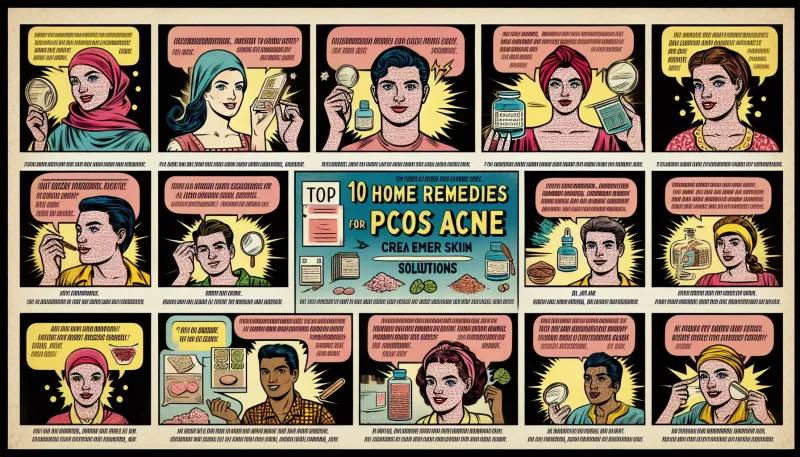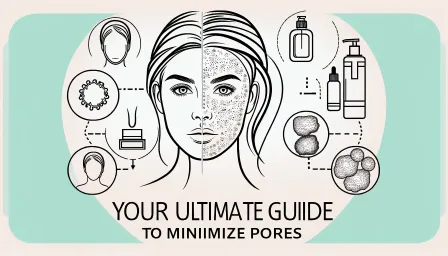Top 10 Home Remedies for PCOS Acne: Clear Skin Solutions

Discover the top 10 home remedies for PCOS acne. Learn how to manage and reduce PCOS-related skin problems naturally with these effective solutions.
Introduction
Polycystic Ovary Syndrome (PCOS) is a hormonal disorder that affects many women worldwide. One of its common symptoms is acne, which can be persistent and challenging to manage. This article delves into the top 10 home remedies for PCOS acne, providing clear skin solutions that are natural, effective, and easy to implement. Understanding and addressing the root causes of PCOS acne can lead to significant improvements in your skin’s health.
What Causes PCOS Acne?
PCOS acne results from hormonal imbalances, particularly elevated levels of androgens (male hormones) that lead to excess oil production, clogging pores, and promoting acne formation. Insulin resistance, common in PCOS, can further exacerbate the problem. To effectively manage PCOS acne, it is crucial to address these underlying hormonal issues through diet, lifestyle changes, and targeted skin care.
1. Apple Cider Vinegar
Apple cider vinegar is renowned for its antibacterial and anti-inflammatory properties, making it an excellent remedy for PCOS acne. It helps balance the skin’s pH levels and removes excess oil.
How to Use:
Mix one part apple cider vinegar with three parts water. Apply it to your skin using a cotton ball, leave it on for 10-15 minutes, and then rinse off with water. Use this remedy once daily for best results.
2. Tea Tree Oil
Tea tree oil is a powerful antiseptic that helps kill acne-causing bacteria. Its anti-inflammatory properties also reduce the redness and swelling associated with acne.
How to Use:
Mix a few drops of tea tree oil with a carrier oil like coconut or jojoba oil. Apply directly to acne-affected areas with a cotton swab. Use this remedy once daily.
3. Aloe Vera
Aloe vera is known for its soothing and healing properties. It helps reduce inflammation and accelerates the healing process of acne-affected skin.
How to Use:
Apply pure aloe vera gel directly to the affected areas. Leave it on overnight and rinse off in the morning. Repeat this process nightly for optimal results.
4. Green Tea
Compounds in green tea possess anti-inflammatory and antimicrobial properties that can help reduce acne. Drinking green tea can also improve insulin sensitivity, which is beneficial for managing PCOS symptoms.
How to Use:
Apply cooled green tea to your skin using a cotton ball, or use it as a facial rinse. Additionally, drinking 2-3 cups of green tea daily can support overall health and hormonal balance.
5. Honey and Cinnamon Mask
Honey has antibacterial properties, while cinnamon boosts circulation and has anti-inflammatory effects. Together, they make a potent combo for tackling acne.
How to Use:
Mix two tablespoons of honey with one teaspoon of cinnamon to form a paste. Apply it to your face, leave on for 10-15 minutes, and then rinse off with warm water. Use this mask once or twice a week.
6. Omega-3 Fatty Acids
Omega-3 fatty acids, found in fish oil, flaxseeds, and walnuts, can help reduce inflammation and improve the overall health of your skin. These fatty acids also play a role in hormone regulation.
How to Use:
Incorporate omega-3 rich foods into your diet, or consider taking an omega-3 supplement after consulting with your healthcare provider.
7. Spearmint Tea
Spearmint tea has anti-androgen properties that can help lower the levels of male hormones in women with PCOS, potentially reducing acne.
How to Use:
Drink one or two cups of spearmint tea daily to help manage hormonal imbalances.
8. Zinc Supplements
Zinc has anti-inflammatory properties and can reduce the occurrence of acne by controlling the activity of oil glands in the skin.
How to Use:
Consult with your healthcare provider about taking a zinc supplement, or add foods rich in zinc like nuts, seeds, and legumes to your diet.
9. Reducing Dairy Intake
Dairy products can exacerbate acne in some individuals due to the hormones present in milk. Reducing dairy intake may help improve skin conditions, including PCOS acne.
How to Use:
Experiment with reducing or eliminating dairy from your diet for a few weeks to see if your skin improves.
10. Stress Management
Stress can worsen hormonal imbalances and trigger acne breakouts. Incorporating stress management techniques like yoga, meditation, and adequate sleep can significantly help manage PCOS acne.
How to Use:
Engage in regular stress-reducing activities, and ensure you get 7-9 hours of quality sleep each night.
Conclusion
Managing PCOS acne requires a holistic approach that addresses both the external skin symptoms and the internal hormonal imbalances. By incorporating these natural home remedies into your routine, you can effectively reduce the severity of acne and improve your skin’s health. Always remember to consult with a healthcare professional before starting any new treatment to ensure it is suitable for your specific needs.



























